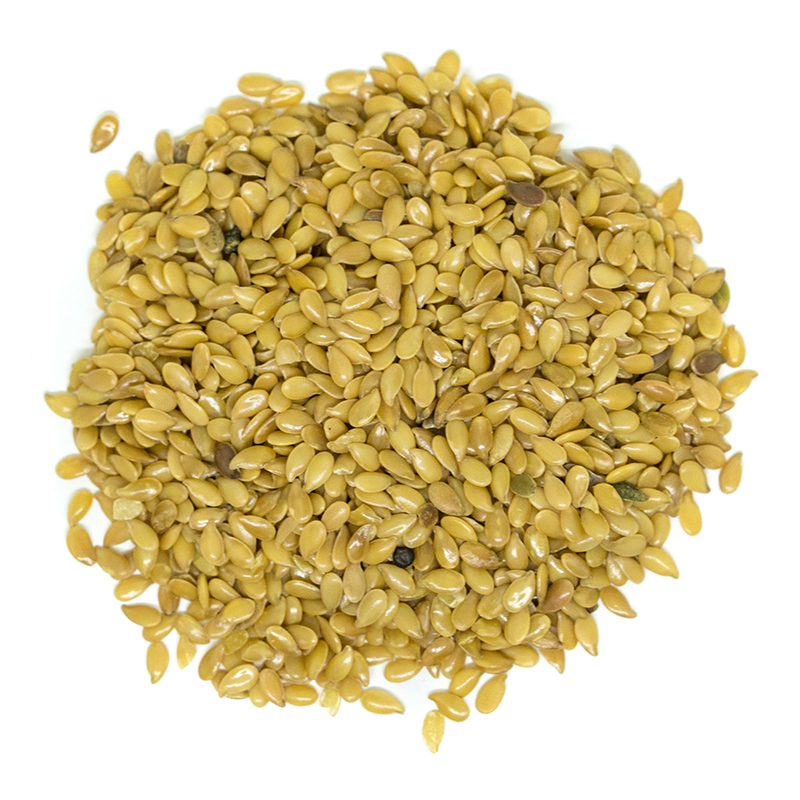-
Description
Flax seeds are shiny, oval-shaped seeds with a golden yellow colour. Golden flax seeds have a palatable nutty flavour that makes them a suitable addition to many baked products. Flax seeds are an excellent source of soluble dietary fibre, complete protein, and Omega-3 fatty acids.
-
Uses
Organic golden flax seeds can be eaten in a number of ways. They add a nutty flavour to breads, bagels, muffins, or granola products. Flax seeds can also be added to smoothies or hot cereal (1 or 2 tablespoons per serving) during or after cooking. For proper digestion, it is best to grind the seeds into a paste or meal before mixing with other ingredients. Tea made from flax seeds is said to be good for bronchial conditions and to have a laxative and soothing effect on the intestinal tract. Steep 1 tablespoon of flax seeds in 2 cups of boiling water for 15 minutes.
-
Storage
Organic flax seeds are rich in oil. The alpha-linolenic acid is stable only in the whole flax seed when stored in a cool dry place away from excessive light and moisture. The whole seed has a shelf life of up to 1 year depending on storage conditions.
-
Nutrition
Nutrition Facts Per 3 tbsp (30 g) Amount % Daily Value Calories 140 - Fat 11 g 15% Saturated Fat 1 g - + Trans Fat 0 g 6% Carbohydrate 9 g - Fibre 8 g 29% Sugars 1 g 1% Sugar Alcohol - - Protein 6 g - Cholesterol 0 mg - Sodium 5 mg 0% Potassium 250 mg 5% Calcium 75 mg 6% Iron 4 mg 22% -
Allergens
Attention: May contain shell, pit and seed fragments.
-
Recipes & Posts
| SKU | Unit Size |
|---|---|
| 60231 | 12 x 400 g |
| 60232 | 2 kg BULK |
| 60234 | 11.3 kg RM |
-
Description
-
Uses
-
Nutrition
-
Storage
-
Allergens
-
Recipes & Posts
-
Flax seeds are shiny, oval-shaped seeds with a golden yellow colour. Golden flax seeds have a palatable nutty flavour that makes them a suitable addition to many baked products. Flax seeds are an excellent source of soluble dietary fibre, complete protein, and Omega-3 fatty acids.
-
Organic golden flax seeds can be eaten in a number of ways. They add a nutty flavour to breads, bagels, muffins, or granola products. Flax seeds can also be added to smoothies or hot cereal (1 or 2 tablespoons per serving) during or after cooking. For proper digestion, it is best to grind the seeds into a paste or meal before mixing with other ingredients. Tea made from flax seeds is said to be good for bronchial conditions and to have a laxative and soothing effect on the intestinal tract. Steep 1 tablespoon of flax seeds in 2 cups of boiling water for 15 minutes.
-
Nutrition Facts Per 3 tbsp (30 g) Amount % Daily Value Calories 140 - Fat 11 g 15% Saturated Fat 1 g - + Trans Fat 0 g 6% Carbohydrate 9 g - Fibre 8 g 29% Sugars 1 g 1% Sugar Alcohol - - Protein 6 g - Cholesterol 0 mg - Sodium 5 mg 0% Potassium 250 mg 5% Calcium 75 mg 6% Iron 4 mg 22% -
Organic flax seeds are rich in oil. The alpha-linolenic acid is stable only in the whole flax seed when stored in a cool dry place away from excessive light and moisture. The whole seed has a shelf life of up to 1 year depending on storage conditions.
-
Attention: May contain shell, pit and seed fragments.
